

Altruism. Define dialectic. Kindred - definition of kindred by the Free Online Dictionary. Kindred[ˈkɪndrɪd] Collins Spanish Dictionary - Complete and Unabridged 8th Edition 2005 © William Collins Sons & Co.
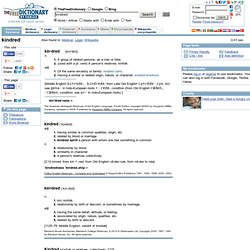
Ltd. 1971, 1988 © HarperCollins Publishers 1992, 1993, 1996, 1997, 2000, 2003, 2005 kindred[ˈkɪndrɪd]adj (= similar) → apparenté(e)kindred spiritn → âme f sœurWe are kindred spirits → Nous sommes des âmes sœurs. kindred Collins German Dictionary – Complete and Unabridged 7th Edition 2005. © William Collins Sons & Co. Rumination (psychology) Rumination is the compulsively focused attention on the symptoms of one's distress, and on its possible causes and consequences, as opposed to its solutions.[1] Rumination is similar to worry except rumination focuses on bad feelings and experiences from the past, whereas worry is concerned with potential bad events in the future.[1] Both rumination and worry are associated with anxiety and other negative emotional states.[1] Rumination has been widely studied as a cognitive vulnerability factor to depression, however its measures have not been unified.[2] In the Response Styles Theory proposed by Nolen-Hoeksema (1998),[3] rumination is defined as the “compulsively focused attention on the symptoms of one's distress, and on its possible causes and consequences, as opposed to its solutions”.
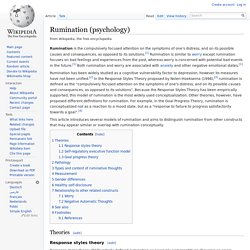
Bourgeoisie. The prototypical bourgeois: Monsieur Jourdain, the protagonist of the play Le Bourgeois gentilhomme (1670), by Molière, is the best would-be nobleman that money can buy.

In Marxist philosophy, the term bourgeoisie denotes the social class who owns the means of production and whose societal concerns are the value of property and the preservation of capital, in order to ensure the perpetuation of their economic supremacy in society.[3] Joseph Schumpeter instead saw the creation of new bourgeoisie as the driving force behind the capitalist engine, particularly entrepreneurs who took risks in order to bring innovation to industries and the economy through the process of creative destruction.[4] Etymology[edit] Bourgeois. Adj.

When pronounced "BOO-zhee" (soft-j sound like in French) refers to a quality of (sometimes mildly) snobby-without-realizing-it, upper-middle-class sensibilities. Usually associated with upper-middle-income white people, but not necessarily. Can involve driving the right car, getting the right (healthy or gourmet) foods, having a professional/white-collar job, always having "nice" things, $4 lattes at Starbucks or elsewhere because you think you're above Starbucks, having a well-diversified stock portfolio and other retirement savings, having a special set of dishes and everything else just for Christmas, status-symbol kids or pets, carbon offsets, thinking $15 wine is cheap, listening to NPR, and gentrifying neighborhoods.
Even though not all of these things may be bad and some of them could be done by anybody (like healthy food or looking down on Starbucks), it's a certain combination and a certain attitude that goes along with it that you know when you see. Repository. Define:acuity. Define:sine qua non. Sine qua non. Sine qua non (/ˌsaɪnɨ kweɪ ˈnɒn/; Latin: [ˈsine kwaː ˈnoːn])[1] or condicio sine qua non (plural: condiciones sine quibus non) refers to an indispensable and essential action, condition, or ingredient.
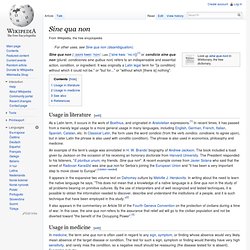
It was originally a Latin legal term for "[a condition] without which it could not be," or "but for... " or "without which [there is] nothing". Usage in literature[edit] As a Latin term, it occurs in the work of Boethius, and originated in Aristotelian expressions.[1] In recent times, it has passed from a merely legal usage to a more general usage in many languages, including English, German, French, Italian, Spanish, Catalan, etc. Define candid. Define frank. Program vs. Programme. JuwBagel I don’t believe that one would say, “I’ll program the computer today.”

One doesn’t program computers, see? He might program for a computer, or use a program on one, but one doesn’t simply program up a computer….While grammatically correct, it doesn’t make much sense. Jensita JuwBagel, I’m not sure if I agree completely. It’s true you don’t “program up a computer”, but you can certainly “program a computer to do something.” Arterial - definition of arterial by the Free Online Dictionary.
The American Heritage® Dictionary of the English Language, Fourth Edition copyright ©2000 by Houghton Mifflin Company.
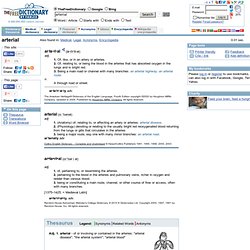
Updated in 2009. Published by Houghton Mifflin Company. All rights reserved. Snake oil. Clark Stanley's Snake Oil Snake oil is an expression that originally referred to fraudulent health products or unproven medicine but has come to refer to any product with questionable or unverifiable quality or benefit.
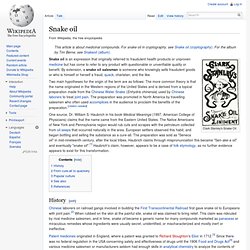
By extension, a snake oil salesman is someone who knowingly sells fraudulent goods or who is himself or herself a fraud, quack, charlatan, and the like. Two main hypotheses for the origin of the term are as follows: The more common theory is that the name originated in the Western regions of the United States and is derived from a topical preparation made from the Chinese Water Snake (Enhydris chinensis) used by Chinese laborers to treat joint pain. The preparation was promoted in North America by travelling salesmen who often used accomplices in the audience to proclaim the benefits of the preparation.
[citation needed] One source, Dr. History[edit] Triage. Only immediate life-saving treatment takes priority over triage.

Triage (/ˈtriːɑːʒ/ or /triːˈɑːʒ/) is the process of determining the priority of patients' treatments based on the severity of their condition. This rations patient treatment efficiently when resources are insufficient for all to be treated immediately. The term comes from the French verb trier, meaning to separate, sift or select.[1] Triage may result in determining the order and priority of emergency treatment, the order and priority of emergency transport, or the transport destination for the patient. Triage may also be used for patients arriving at the emergency department, or telephoning medical advice systems,[2] among others. This article deals with the concept of triage as it occurs in medical emergencies, including the prehospital setting, disasters, and emergency room treatment. Define:soliloquy. Define:equanimity. Define:ape. Define:bigamist. Define:infelicitous. Define:thematic.
Define:ubiquitous. Idiom. Examples[edit] The following sentences contain idioms.
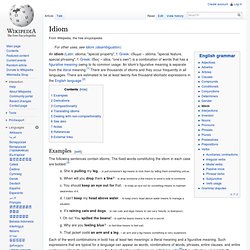
The fixed words constituting the idiom in each case are bolded:[3] a. She is pulling my leg. - to pull someone's leg means to trick them by telling them something untrue. b. C. D. E. F. G. H. Each of the word combinations in bold has at least two meanings: a literal meaning and a figurative meaning. H. I. J. K. Proverbs such as these have figurative meaning. Derivations[edit] Mutatis mutandis. Mutatis mutandis is a Latin phrase meaning "changing [only] those things which need to be changed" or more simply "[only] the necessary changes having been made".[1][2][3] The phrase carries the connotation that the reader should pay attention to differences between the current statement and a previous one, although they are analogous. 100 Exquisite Adjectives. By Mark Nichol Adjectives — descriptive words that modify nouns — often come under fire for their cluttering quality, but often it’s quality, not quantity, that is the issue.
Plenty of tired adjectives are available to spoil a good sentence, but when you find just the right word for the job, enrichment ensues. Practice precision when you select words. Here’s a list of adjectives: Subscribe to Receive our Articles and Exercises via Email You will improve your English in only 5 minutes per day, guaranteed! Define:wiki. Define principle. Define:pedagogy. Define:proponent. Nadir.